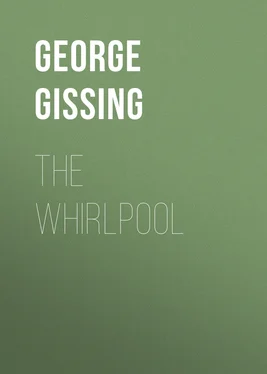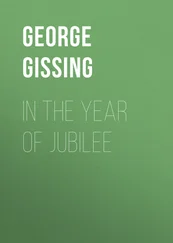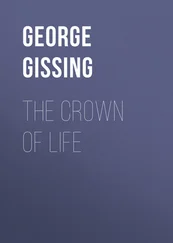George Gissing - The Whirlpool
Здесь есть возможность читать онлайн «George Gissing - The Whirlpool» — ознакомительный отрывок электронной книги совершенно бесплатно, а после прочтения отрывка купить полную версию. В некоторых случаях можно слушать аудио, скачать через торрент в формате fb2 и присутствует краткое содержание. Жанр: foreign_prose, literature_19, foreign_antique, на английском языке. Описание произведения, (предисловие) а так же отзывы посетителей доступны на портале библиотеки ЛибКат.
- Название:The Whirlpool
- Автор:
- Жанр:
- Год:неизвестен
- ISBN:нет данных
- Рейтинг книги:4 / 5. Голосов: 1
-
Избранное:Добавить в избранное
- Отзывы:
-
Ваша оценка:
- 80
- 1
- 2
- 3
- 4
- 5
The Whirlpool: краткое содержание, описание и аннотация
Предлагаем к чтению аннотацию, описание, краткое содержание или предисловие (зависит от того, что написал сам автор книги «The Whirlpool»). Если вы не нашли необходимую информацию о книге — напишите в комментариях, мы постараемся отыскать её.
The Whirlpool — читать онлайн ознакомительный отрывок
Ниже представлен текст книги, разбитый по страницам. Система сохранения места последней прочитанной страницы, позволяет с удобством читать онлайн бесплатно книгу «The Whirlpool», без необходимости каждый раз заново искать на чём Вы остановились. Поставьте закладку, и сможете в любой момент перейти на страницу, на которой закончили чтение.
Интервал:
Закладка:
Later issues contained much fuller reports. The man who found the body had explained his behaviour in going up to the unused room, and it relieved the dark affair with a touch of comedy. Before coming to work, he had quarrelled with his wife, and, rather than go home in the early hours of the morning, he hit upon the idea of finding a sleeping-place here on the premises, to which he could slink unnoticed. 'It's little enough sleep I get in my own house,' was his remark to the reporter who won his confidence. Clubmen were hilarious over this incident, speculating as to the result of its publication on the indiscreet man's domestic troubles.
It was not unremarked that a long time elapsed between the discovery of the suicide and its being heard of by anyone who had an interest in making it generally known. With the exception of two persons, all who were engaged upon the production of the newspaper went home in complete ignorance of what had happened, so cautiously and successfully was the situation dealt with by the sub-editor and his informant. When, after an examination by the doctor, who had been summoned in all secrecy, it became necessary to communicate with the police, the employees had all gone away, and the printed sheets had been conveyed to the distributing agents. Naturally, the subeditor of Stock and Share ' preserved a certain reticence in the matter; but one could hardly be mistaken in assuming that the directors of the Britannia Company—two or three of them, at all events—had an opportunity of surveying their position long before the hour when this momentous news got abroad.
With regard to the company's affairs, only conjecture could be as yet indulged in. In view of the immediate stoppage of business, it was pretty safe to surmise that alarming disclosures awaited the public. No one, of course, would be justified in prejudging the case against the unhappy man who, amid seemingly brilliant circumstances, had been driven to so desperate an act.
And so on, and so on, in one journal after another, in edition upon edition. Harvey Rolfe read them till he was weary, listened to the gossip of the club till he was nauseated. He went home at length with a headache, and, having carefully avoided contact with Buncombe or Mrs Handover, made an effort to absorb himself in a volume of Gregorovius, which was at present his study. The attempt was futile. Talk still seemed to buzz about him; his temples throbbed; his thoughts wandered far and wide. Driven to bed long before his accustomed hour, he heard raucous voices rending the night, bellowing in hideous antiphony from this side of the street and the other, as the vendors of a halfpenny paper made the most of what Providence had sent them.
The first thing after breakfast next morning, he posted a line to Hugh Carnaby. 'Is there any way in which I can be of use to you? If you think not, I shall be off tomorrow to Greystone for a few days. I feel as if we were all being swept into a ghastly whirlpool which roars over the bottomless pit. Of course, I will stay if I can do anything, no matter what. Otherwise, address for a week to Basil Morton's.'
This he dropped into the nearest pillar-box, and, as the sun was endeavouring to shine, he walked the length of the street, a pretence of exercise. On his way back he was preceded by a telegraph boy, who stopped at Buncombe's front door, and awoke the echoes with a twofold double knock. Before the servant could open, Harvey was on the steps.
'What name?'
'Rolfe.'
'For me, then.'
He tore open the envelope.
'Could you come at once? Something has happened.—Abbott.'
The boy wished to know if there would be a reply. Harvey shook his head, and stepped into the hall, where he stood reflecting. What could have happened that Edgar Abbott should summon him? Had his wife run away?– Ah, to be sure, it must have something to do with Wager's children—an accident, a death. But why send for him ?
He made a little change in his dress, and drove forthwith to Kilburn. As his cab stopped, he saw that all the blinds in the front of the Abbotts' house were drawn down. Death, then, obviously. It was with a painful shaking of the nerves that he knocked for admission.
'Mr. Abbott–?'
The servant girl, who had a long-drawn face, said nothing, but left him where he stood, returning in a moment with a mumbled 'Will you please to come in, sir?' He followed her to the room in which he had talked with Mrs. Abbott two days ago; and she it was who again received him. Her back to the light, she stood motionless.
'Your husband has telegraphed for me–'
A voice that struggled with a sob made thick reply–
'No—I—he is dead!'
The accent of that last monosyllable was heart-piercing. It seemed to Harvey as though the word were new-minted, so full it sounded of dreadful meaning.
'Dead?'
Mrs. Abbott moved, and he could see her face better. She must have wept for hours.
'He has been taking morphia—he couldn't sleep well—and then his neuralgia. The girl found him this morning, at seven o'clock—there.'
She pointed to the couch.
'You mean that he had taken an overdose—by accident–'
'It must have been so. He had to work late—and then he must have lain down to sleep.'
'Why here?'
'A flood of anguish whelmed her. She uttered a long moan, all the more terrible for its subdual to a sound that could not pass beyond the room. Her struggle for self-command made her suffering only the more impressive, the more grievous to behold.'
'Mr. Rolfe, I sent for you because you are his old friend. I meant to tell you all the truth, as I know it. I can't tell it before strangers—in public! I can't let them know—the shame—the shame!'
Harvey's sympathy gave way to astonishment and strange surmise. Hurriedly he besought her not to reveal anything in her present distress; to wait till she could reflect calmly, see things in truer proportion. His embarrassment was heightened by an inability to identify this woman with the Mrs. Abbott he had known; the change in her self-presentment seemed as great and sudden as that in her circumstances. Face and voice, though scarce recognisable, had changed less than the soul of her—as Harvey imaged it. This entreaty she replied to with a steadiness, a resolve, which left him no choice but to listen.
'I cannot, dare not, think that he did this knowingly. No! He was too brave for that. He would never have left me in that way—to my despair. But it was my fault that made him angry—no, not angry; he was never that with me, or never showed it. But I had behaved with such utter selfishness–'
Her misery refused to word itself. She sank down upon a chair and sobbed and moaned.
'Your grief exaggerates every little fault,' said Harvey.
'No—you must hear it all—then perhaps I can hide my shame from strangers. What use would it be if they knew? It alters nothing—it's only in my own heart. I have no right to pain you like this. I will tell you quietly. You know that he went to Waterbury, on business. Did he tell you?—it was to buy a share in a local newspaper. I, in my blindness and selfishness, disliked that. I wanted to live here; the thought of going to live in the country seemed unbearable. That Edgar was overworked and ill, seemed to me a trifle. Don't you remember how I spoke of it when you came here the other morning?—I can't understand myself. How could I think so, speak so!'
The listener said nothing.
'He did what he purposed—made a bargain, and came back to conclude the purchase by correspondence. But his money—the small capital he counted upon—was in "Britannia" shares; and you know what happened yesterday—yesterday, the very day when he went to sell the shares, thinking to do so without the least difficulty.'
Читать дальшеИнтервал:
Закладка:
Похожие книги на «The Whirlpool»
Представляем Вашему вниманию похожие книги на «The Whirlpool» списком для выбора. Мы отобрали схожую по названию и смыслу литературу в надежде предоставить читателям больше вариантов отыскать новые, интересные, ещё непрочитанные произведения.
Обсуждение, отзывы о книге «The Whirlpool» и просто собственные мнения читателей. Оставьте ваши комментарии, напишите, что Вы думаете о произведении, его смысле или главных героях. Укажите что конкретно понравилось, а что нет, и почему Вы так считаете.












